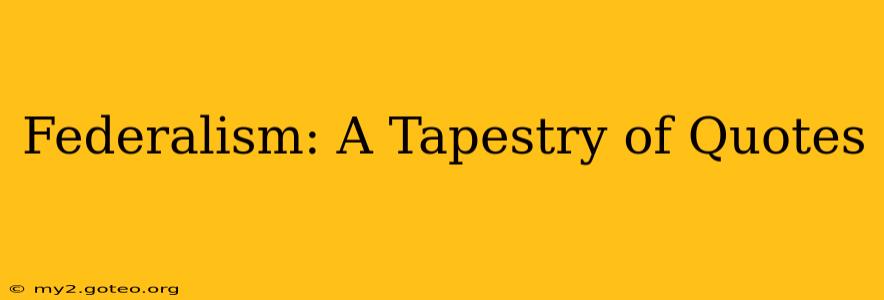Federalism, the intricate system of shared power between a central government and its constituent units, has shaped nations across the globe. It's a complex system, lauded for its flexibility and adaptability, yet often fraught with tension and debate. This exploration delves into the essence of federalism through insightful quotes, examining its historical context, inherent challenges, and enduring relevance. We’ll explore the diverse perspectives offered by prominent figures throughout history, shedding light on the ongoing conversation surrounding this fundamental aspect of governance.
What is Federalism?
Before diving into the quotes, let's define federalism. Simply put, federalism is a system of government where power is constitutionally divided between a central, national government and regional, state or provincial governments. This division aims to balance the need for national unity with the desire for local autonomy. It’s a delicate balance, often described as a "tapestry" woven from different threads of authority and responsibility.
Exploring Key Quotes on Federalism:
Here are some powerful quotes that illuminate various facets of federalism, addressing both its virtues and its vulnerabilities:
"The powers not delegated to the United States by the Constitution, nor prohibited by it to the States, are reserved to the States respectively, or to the people." - Tenth Amendment to the United States Constitution
This foundational quote encapsulates the core principle of American federalism: the enumeration of powers. The federal government only possesses the powers explicitly granted to it by the Constitution; all remaining powers are reserved for the states or the people. This principle constantly shapes the ongoing dialogue between federal and state governments regarding jurisdiction and authority.
"A pure democracy can admit of no cure to the mischiefs of faction. A common passion or interest will, in almost every case, be felt by a majority of the whole; a communication and concert result from the form of government itself; and there is nothing to check the inducements to sacrifice the weaker party." - James Madison, Federalist No. 10
Madison, a key architect of the US Constitution, addresses a central concern in federalism: the potential for tyranny of the majority. He argues that a federal system, by dividing power geographically, mitigates this risk. The diversity of interests across different states helps prevent a single, dominant faction from controlling the entire nation.
"The very essence of federalism is the sharing of power." - William H. Rehnquist
Chief Justice Rehnquist, known for his emphasis on states' rights, highlights the inherent nature of federalism as a system of shared, not absolute, power. This shared authority necessitates constant negotiation and compromise between different levels of government.
"In a federation, power is divided between the centre and the regions in such a way that neither can readily dominate the other." - K.C. Wheare, Federal Government
This concise definition underscores the balance of power central to federalism. The aim is to prevent either the national or regional governments from becoming overwhelmingly dominant, preserving a healthy equilibrium.
What are the advantages of federalism?
Federalism offers several key advantages. It promotes diversity, allowing for policies tailored to local needs. It fosters political participation, empowering citizens at multiple levels of government. It also enhances governmental efficiency by distributing responsibilities. Finally, it provides a check on tyranny, preventing the concentration of power in a single entity.
What are the disadvantages of federalism?
Conversely, federalism presents challenges. It can lead to inefficiency and duplication of effort due to overlapping jurisdictions. It can also cause inconsistency in policies across regions and create complexity in navigating different levels of government.
How does federalism work in practice?
Federalism works through a complex interplay of constitutional provisions, laws, judicial decisions, and political negotiations. The precise mechanisms vary depending on the specific country and its constitutional framework. Often, it involves processes like intergovernmental relations, fiscal federalism (the distribution of financial resources), and judicial review (the courts' power to interpret the constitution and resolve disputes).
What are some examples of federal systems?
Beyond the United States, many countries employ federal systems, including Canada, Australia, Germany, India, and Brazil. Each demonstrates the unique adaptation and evolution of this complex system to different historical, cultural, and geographic contexts.
Conclusion:
Federalism remains a dynamic and evolving system of governance, a continuous negotiation between competing interests and principles. These quotes provide valuable insight into the ongoing conversation, illuminating both the ideals and the realities of shared power. The enduring relevance of federalism lies in its capacity to adapt to changing circumstances while striving to balance national unity with local autonomy. Understanding its complexities, both its strengths and its weaknesses, is crucial for any engaged citizen in a federal system.

